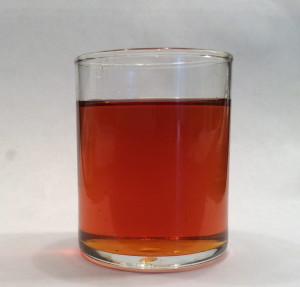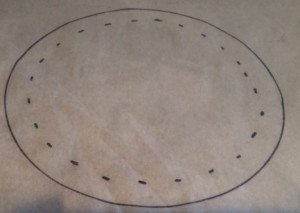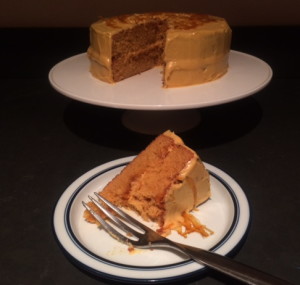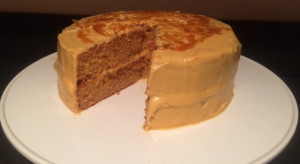I had some time on my hands the other day, picked up James Beard’s American Cookery and got myself good and lost in it. About forty-five minutes in I ran into “Burnt Leather, Brownstone Front, or Caramel Cake.” Caramel CAKE? Dead stop, must make.
I did a little looking around and found an article from 1996 by Marrion Cunningham in the LA Times, “At Last! True Burnt Sugar,” in which she says that Burnt Sugar Cake was “one of the most popular desserts around the turn of the century.” She goes on to gush about the caramel syrup that is the heart of the matter and frankly, I think I’m going to follow suit and pour some over poached pears and try it on oatmeal next time I make some. Joy has a recipe for burnt sugar cake as well but theirs involves whipping the egg whites and folding them in at the end which is fussier than I want to get at home. The recipe that follows is a little bit James and a little bit Marrion, with a little more syrup and a little more salt here and there because it seemed to want it. James recommends either vanilla or rum – to which I thought – why choose? The caramel and vanilla and rum make such lovely harmonies together in there I had to go with both.
One of my tasters thought it would be nice if there were some little crunchy bits of caramelized sugar in there which lead to the idea of the lacy sugar topping. It started out a bit lacier than it ended up since I forgot I’d stashed it in the oven and preheated the oven to bake the cakes with it in there so it softened a bit and the lacier bits kinda blobbed out but you get the idea. I suppose if you really wanted to go all out, you could make little panels of sugar and press them to the sides of the cake as well.
Since it’s been snowy and icy and who-wants-to-go-out-in-it around here, I’ve had a chance to make and tweak this cake a few times. It makes a nice partner to an afternoon cup of tea.
Caramel Syrup:
1 cup (230 g) sugar
3/4 cup hot water (180 ml), plus a few tablespoons, optional

- Place the sugar in a heavy skillet (not non stick). Stir a few tablespoons of water into the sugar, three or so should do it – you want it to look like wet sand that’s the right consistency for a dribble castle. If you over do it, don’t worry, it will just take a little longer to caramelize the syrup.
- Bring the mixture to a boil and let it simmer until it turns a deep golden color, emits the faintest whiff of smoke, and smells right to you – it should smell like caramel, a touch burnt but not too much (about 10 minutes). Once the sugar begins to melt don’t walk away from the pan, the color deepens rapidly.
- Remove the pan from the heat and carefully pour in a little of the water. The mixture will sputter vigorously so don’t get too close to it. Keep adding the water a little at a time as the sputtering slows down.
- Return the pan to the heat and stir until the caramel re-dissolves, and the syrup thickens a little. (A heat-proof silicon spatula is the best tool for the job.)
- Cool.
A note about sugar: if you use organic sugar omit the water in the beginning; strange, strange things happen when you try the water in the sugar/melt method. For organic sugar just put the sugar in the pan and turn the heat to high. When the sugar begins to melt around the edges, lower the heat, and kind of mash the unmelted sugar into the sugar that is melting using a silicon or heat proof spatula or spoon. It may form lumps, be patient and keep stirring/mashing the lumps and it will eventually all melt. Organic sugar starts off a golden color when melted so to tell when it’s done keep taking a whiff of it and when it smells like caramel, it’s done.
Yield: 1 cup (about) syrup
If you are confident about the whole melting sugar process you can make the lacy caramel topping for the cake from the melted sugar for the syrup, you only need about a tablespoon.
Cake:
2 cups (243 g) cake flour
1 tablespoon (15 ml) baking powder
3/4 teaspoon (3.75 ml) salt
1/2 cup (113 g) salted butter, 1 stick
1 cup (230 g) sugar
2 eggs
1/3 cup (80 ml) caramel syrup
1 teaspoon (5 ml) vanilla
1 tablespoon (15 ml) dark rum
3/4 cup (180 ml) milk
- Preheat oven to 350°.
- Grease two 8″ cake pans with butter or Pam, line with parchment paper, grease the paper and flour the pans, set aside. Alternatively you can just grease and flour the pans, but I like the added security that the parchment paper gives.
- Sift the flour, baking powder and salt together in a bowl and set aside.
- Cream the butter and sugar until light and fluffy.
- Beat in the eggs, one at a time, then the vanilla and rum.
- Mix in the dry ingredients alternating with the milk in 3 batches. Stir in the caramel syrup.
- Pour into the prepared pans and bake for 25 – 30 minutes or until cake springs back lightly in center and a tester comes out clean. (If you are a touch neurotic, like me, about dividing the batter in half evenly it worked out to about 15.5 oz. of raw batter per pan.)
- Let cake cool on a wire rack for 10 minutes then invert cakes onto your hand, remove parchment paper, turn upright again on the wire rack and cool completely.
- When the cakes are cool, level them if desired, poke them with a fork or skewer and brush with some of the caramel syrup, about a tablespoon per layer.
Frosting:
1/2 cup (113 g) salted butter, 1 stick
1/2 teaspoon (2.5 ml) salt
2 egg yolks
1 1/2 cups (200 g) powdered sugar
1/3 cup (80 ml) caramel syrup
1/2 teaspoon (2.5 ml) vanilla
- In the bowl of a standing mixer beat the butter until it is very creamy and almost white, about 8 – 10 minutes.Beat in the salt.
- Add the yolks one at a time, beating until combined.
- Add the sugar 1/4 cup at a time beating until well incorporated.
- Beat in the caramel syrup and vanilla. Test a little of the frosting if it is the least bit gritty continue beating until all the sugar and salt are absorbed. When the cakes are cooled, fill and frost.
I kept the cake in the fridge, with some plastic wrap pressed to the exposed cake to keep it from drying out and we whittled away at it for three days and it seemed to hold just fine. Let the cake come to room temperature before eating it, the flavor is better when it has warmed up a little.
Lacy Caramel Topping:
1/4 cup sugar
Parchment paper
Butter or Pam

- Trace the bottom of your cake pan onto the parchment paper. About 1/2 inch in from the circle, make a series of dots to form a smaller, inner circle. Turn the parchment paper over and place on a sheet tray ink-side down. Grease the circle.
- Melt the sugar as you would for the caramel topping.
- As soon as it begins to turn golden pull the pan off the heat and swirl it around a little so it starts to cool a bit.
- Keeping the pan very close to the sheet tray so you don’t end up with sugar threads everywhere, use a fork to pick up bits of the syrup and drizzle it onto the parchment paper. Drizzle into the inner circle so it will fit neatly on top of the cake. The cooled sugar breaks easily so you can easily trim your lacy top to fit but there is something satisfying about coloring inside the lines every now and then.
If you have extra melted sugar, you can add a little water and make more syrup if you want.
Gently peel the hardened sugar off the parchment and place on top of the cake.

